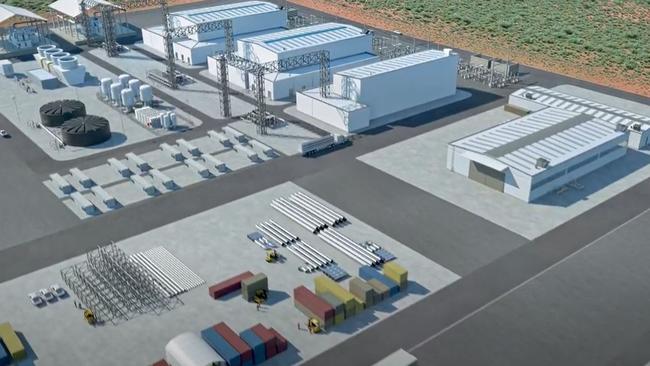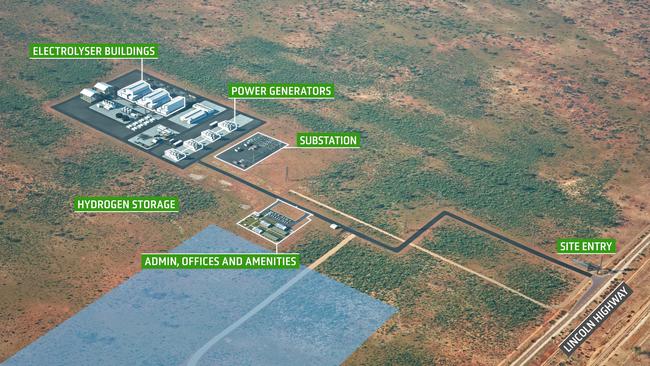Analysis: $600m hydrogen power plant the biggest gamble of Premier Peter Malinauskas’s career | Paul Starick
Spending almost $600m of public money on emerging technology is the biggest gamble of Premier Peter Malinauskas’s career so far, writes Paul Starick.
SA News
Don't miss out on the headlines from SA News. Followed categories will be added to My News.
Spending almost $600m of public money on the world’s largest hydrogen power plant at Whyalla is a decisive and risky venture.
It’s either a bold move for SA to get rich from the global clean energy revolution or a foolish waste of taxpayers’ money, depending on whether you believe Labor or Liberal arguments respectively.
This is a historically large amount of public funds to be deploying on a project that involves emerging technology and relies on costings prepared in early 2021, before inflation ran wild.
This makes the $593m hydrogen power plant outside Whyalla the biggest gamble of Premier Peter Malinauskas’s career so far.

As far as punts go, Mr Malinauskas is all in on hydrogen. In a message on his official website, the Premier touts the government-owned Whyalla hydrogen plant in just the sixth sentence, ranking it behind only health and education as a key policy.
Mr Malinauskas has evangelised his hydrogen message across the world since becoming Premier in March last year, preaching about the hydrogen plant in Japan, South Korea, Germany and the Netherlands. In Rotterdam in May, he delivered a keynote address to the World Hydrogen Summit & Exhibition, touted as “the leading global platform where hydrogen business gets done”.
The most significant step in the project, thus far, was on Sunday, when corporate partners for the hydrogen power plant’s design and construction were announced.
Once again, Mr Malinauskas outlined a lofty vision. “This is a world-leading opportunity for South Australia, that has the potential to rival Victoria’s gold rush, the coal boom in Queensland, or Western Australia’s development of iron ore and gas,” he said.
“ We have all the things the world will need to decarbonise – abundant copper and magnetite, the world’s best coincident wind and solar resources, world-leading renewable energy penetration and, soon, the ability to harness this abundant clean energy in the form of hydrogen.
“ We can use this clean hydrogen to firm our electricity grid, but more than that, we can use it to help reindustrialise the Upper Spencer Gulf, creating thousands of jobs in the process.”

These are fine goals. But, thus far, there is somewhat thin evidence to support them and justify the expenditure of $600m.
The costings the Premier has relied upon for Sunday’s announcement and beyond are based on Frontier Economics modelling released in March, 2021.
This modelling underpinned the Premier’s statements this week that the hydrogen plant would reduce the cost of wholesale electricity by 8 per cent, benefiting consumers through lower retail prices. These costings were detailed when The Advertiser broke the story about the hydrogen plant in March, 2021.
Crucially, that modelling does not include the impact of an interconnector between SA and NSW, Project EnergyConnect, because Frontier said at the time “its viability appears to be in serious question”. By August this year, though, the project was approaching 80 per cent completion on the SA side.
The Advertiser asked Frontier if it stood by its costings but did not receive a response.
In an SA Productivity Commission inquiry into SA’s renewable energy competitiveness released in August last year, chairman Adrian Tembel says SA has a “legitimate economic claim to potential competitive advantage in the renewable energy and some associated sectors”. But global competition for investment is fierce, he says, and SA will need to be “world-class in all respects” and “we will probably also need a little luck”.
At Sunday’s hydrogen announcement, Mr Malinauskas said: “We can produce it here in South Australia cheaper than anywhere else in the world, if we play our cards right, which is what this project is all about.”
The government’s cards are on the table, backed by $593m in taxpayer funds. As Grattan Institute energy expert Tony Wood told The Advertiser, time will tell if that wager delivers a burgeoning hydrogen industry.
More Coverage
Originally published as Analysis: $600m hydrogen power plant the biggest gamble of Premier Peter Malinauskas’s career | Paul Starick





